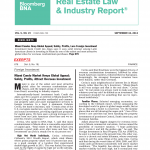Miami Condo Market Keeps Global Appeal; Safety, Profits, Attract Overseas Investment
Miami is one of the safest and most attractive global cities for overseas condominium purchases, and the largest group of investors come from Brazil, according to industry experts.
Internationally-based investment bank Credit des Alpes saw fit to acquire an interest in Miami-based Parinvest Group, which provides residential and commercial property sales and asset management services to foreign investors. In a Sept. 4 statement, Fabrizio
Cerina, the bank’s chairman, said ‘‘Certain areas of the U.S. real estate market are, and will continue to be, safe and sound investments, providing significant prospects
for capital gains. We have seen a strong increase in interest from our Latin American client base and we expect this trend to continue.’’
Cerina, who spoke to BNA Sept. 7, said that many condominiums in Miami allow a reasonable expectation of capital gain. ‘‘Real estate in the Miami beach area
presents a good yield—even after taxes and fees. The investments can yield a steady five to six percent net.’’
High Net Worth Individuals. Cerina referenced Citibank’s 2012 Wealth Report, which cited Miami, where prime property values rose 19 percent last year, as a good example of a location that experienced double-digit growth in 2011. This was fueled, the report
said, by the flight of capital by high net worth individuals (HNWI) who found favorable exchange rates during the credit crunch. ‘‘Citibank includes Miami among the
10 most interesting cities [for investment] in the world,’’ Cerina said. ‘‘And I agree with that.’’
Cerina said that Brazilians were the biggest drivers of overseas condominium investment, followed by other South American countries, followed then by Europeans.
Surprisingly, his strongest European investors have been Italians, rather than Germans.
Cerina’s main neighborhood of interest lies in Miami Beach, rather than the city’s downtown. ‘‘Miami Beach is still very unique and that is the real draw,’’ Cerina
said. ‘‘In real estate you always want to make sure that whatever you buy can’t be diluted as an investment. The investment shouldn’t be something that can be repro-
duced indefinitely.’’
Familiar Places. Selected emerging economies, according to the Citibank report, will be surpassing the developed world in gains in global mega-wealth, but as far as choosing a home is concerned, ‘‘it’s the familiar places that are still drawing the super-rich.’’ One of Parinvest’s core activities has been handling the property investments of prominent Central, South American, and European families.
Asked about the biggest dangers for overseas investors in Miami commercial real estate, Cerina named the possibility of excessive taxation. ‘‘I hope politicians don’t overdo it and kill the golden egg,’’ he said. The Foreign Investment in Real Property Tax Act (FIRPTA),
he said, is a bad idea at the present time. His other concern is a chronic real estate dilemma, where everybody wants to sell the same thing at the same time. Cerina
said that during the worst times of 2008, 2009, and 2010 condo units performed consistently well above market conditions. ‘‘The liquidity has always been there and
market volatility has been high, but it normalized very quickly. Market volatility has never been [deemed] unacceptable by prudent investors.’’

